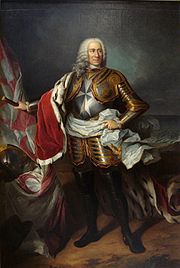
Manuel Pinto de Fonseca
Encyclopedia



Portugal
Portugal , officially the Portuguese Republic is a country situated in southwestern Europe on the Iberian Peninsula. Portugal is the westernmost country of Europe, and is bordered by the Atlantic Ocean to the West and South and by Spain to the North and East. The Atlantic archipelagos of the...
. He was the 68th Prince
Prince of the Church
The term Prince of the Church is nowadays used nearly exclusively for Catholic Cardinals. However the term is historically more important as a generic term for clergymen whose offices hold the secular rank and privilege of a prince or are considered its equivalent...
and Grand Master of the Order of Malta from 1741 to 1773. He was a Portuguese
Portuguese people
The Portuguese are a nation and ethnic group native to the country of Portugal, in the west of the Iberian peninsula of south-west Europe. Their language is Portuguese, and Roman Catholicism is the predominant religion....
Nobleman, the son of Miguel Álvaro Pinto da Fonseca, Alcaide-Mór de Ranhados, and wife Ana Pinto Teixeira.
He was elected on 18 January 1741. On 25 May 1743 he gave his name to the then town of Qormi
Qormi
Qormi is a city in Malta with a population of 18,550 , which makes it the second largest locality in Malta...
giving it the status of a city (Città Pinto). In 1749, one of his bodyguards, Cassar, refused to join a plot led by Pasha Mustafa to stage a Muslim slave revolt. This refusal led to the exposure and suppression of the revolt. This event was then celebrated on every anniversary, 29 June. Pinto created several new noble titles which was greatly resented by some of the older nobles of Malta and gained a reputation for imposing heavy taxes. He expelled the Jesuits from Malta. He completed the Auberge de Castille
Auberge de Castille
The Auberge de Castille is located within the city of Valletta and houses the office of the Prime Minister of Malta.-Order of St.John:When the Knights of St John built the city of Valletta they constructed an auberge or inn for each seven of their eight langues...
, one of the most important buildings in the capital city, Valletta
Valletta
Valletta is the capital of Malta, colloquially known as Il-Belt in Maltese. It is located in the central-eastern portion of the island of Malta, and the historical city has a population of 6,098. The name "Valletta" is traditionally reserved for the historic walled citadel that serves as Malta's...
, which had been started in 1574 and his bust and arms adorn its façade. Today this building houses the Office of the Prime Minister. He made substantial donations to the Conventual Church, and of the most notable mementos worth mentioning are two large and heavy bells cast by the Master Founder of the Order of St. John, Aloisio Bouchut in 1747 and 48 respectively which still hang in the belfries of the Co-Cathedral. Pinto built several storehouses on the Marina which still bear his name. When he died his body was laid to rest in a monument with a mosaic portrayal of him. This is a major tourist attraction in Malta.
He was a friend of Cagliostro.
His coat of arms portrays five red crescents simbolizing that he once defeated five Ottoman Turks single-handedly. The city of Qormi adopted this as its own coat of arms and flag. Actually, those are the Arms of the Pinto family with the enamels exchanged.
He had an illegitimate son by one Rosenda Paulichi, daughter of Alberigo Paulichi and wife Patronilla Ramuzetta, named José António Pinto da Fonseca e Vilhena, who married his first cousin Maria Inácia Pinto da Fonseca de Sousa Teixeira e Vilhena, illegitimate daughter of Francisco Vaz Pinto (his father's brother) by one Clara Cerqueira.

